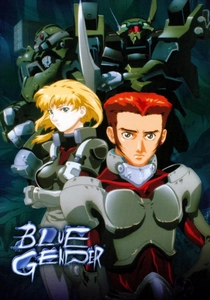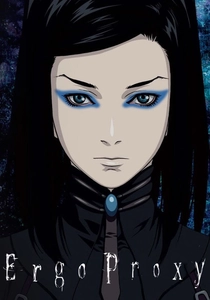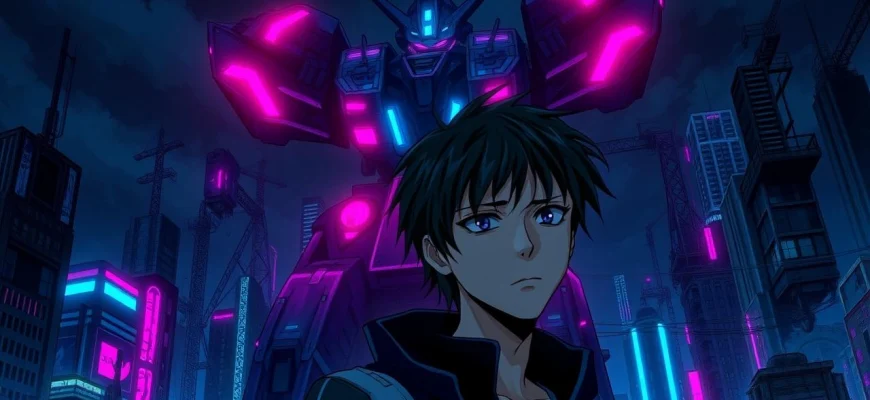- Ghost in the Shell: Stand Alone Complex (2002)
- Blue Gender (1999)
- Paranoia Agent (2004)
- Ergo Proxy (2006)
- Evangelion: 2.0 You Can (Not) Advance (2009)
- Evangelion: 1.0 You Are (Not) Alone (2007)
- Evangelion: 3.0 You Can (Not) Redo (2012)
- Psycho-Pass (2012)
- Evangelion: 3.0+1.0 Thrice Upon a Time (2021)
- SSSS.Gridman (2018)
If you're a fan of the groundbreaking anime series 'Neon Genesis Evangelion' (1995), you're likely craving more shows or movies that capture its unique blend of psychological depth, mecha action, and existential themes. This article explores 10 similar titles that will satisfy your appetite for complex storytelling, intense character development, and mind-bending narratives. Whether you're drawn to the philosophical undertones, the emotional turmoil, or the epic battles, these recommendations will keep you engaged and thinking long after the credits roll.

Ghost in the Shell: Stand Alone Complex (2002)
Description: Like Neon Genesis Evangelion, Ghost in the Shell: Stand Alone Complex explores the intersection of humanity and technology, questioning what it means to be human in a world where the line between man and machine is blurred. Both series feature complex narratives that delve into philosophical and ethical dilemmas, with a strong emphasis on character development and psychological depth.
Fact: The series is based on the manga by Masamune Shirow, which also inspired the 1995 film. Stand Alone Complex refers to a phenomenon where unrelated individuals independently commit similar crimes, a concept explored in the series. The show's animation was groundbreaking at the time, blending 2D and 3D techniques seamlessly.
 Watch Now
Watch Now 
Blue Gender (1999)
Description: Blue Gender shares with Neon Genesis Evangelion a post-apocalyptic setting where humanity is on the brink of extinction, fighting against monstrous creatures. Both series focus on the psychological struggles of their protagonists as they confront their fears and the horrors of their world. The themes of survival, human resilience, and the cost of war are central to both narratives.
Fact: Blue Gender was directed by Masashi Abe, who also worked on the animation for Akira. The series was originally intended to be a more straightforward action show but evolved into a deeper exploration of human nature and survival. The 'Blue' in the title refers to the alien creatures that threaten humanity, named for their distinctive coloration.
 Watch Now
Watch Now 
Paranoia Agent (2004)
Description: Paranoia Agent, like Neon Genesis Evangelion, is a psychological thriller that explores the darker aspects of the human mind. Both series use surreal and symbolic storytelling to delve into themes of trauma, societal pressure, and the nature of reality. The shows challenge viewers to interpret their narratives and draw their own conclusions.
Fact: The series was created by Satoshi Kon, known for his films Perfect Blue and Paprika. The show's opening theme, 'Yume no Shima Shinen Kouen,' is performed by Susumu Hirasawa, who also worked on the soundtrack for Berserk. Paranoia Agent was Kon's only foray into television, as he primarily focused on feature films.
 Watch Now
Watch Now 
Ergo Proxy (2006)
Description: Similar to Neon Genesis Evangelion, Ergo Proxy delves into deep philosophical and psychological themes, exploring the nature of humanity, identity, and existentialism. Both series feature a dystopian setting where the protagonists grapple with their roles in a world filled with mysteries and hidden truths. The storytelling is complex and often requires the viewer to engage deeply with the material to fully understand its layers.
Fact: The series was directed by Shukou Murase, who also worked on Witch Hunter Robin and Gundam Wing. The title 'Ergo Proxy' is derived from the philosophical term 'ergo,' meaning 'therefore,' and 'proxy,' indicating a stand-in or substitute. The series features a unique blend of cyberpunk and post-apocalyptic elements, creating a visually striking and thematically rich narrative.
 Watch Now
Watch Now 
Evangelion: 2.0 You Can (Not) Advance (2009)
Description: This second film in the Rebuild series diverges more significantly from the original TV series, introducing new characters and plot twists. Like the original, it explores themes of human connection, loneliness, and the burden of responsibility. The film's intense action sequences and emotional depth are hallmarks of the Evangelion franchise.
Fact: The film introduces Mari Illustrious Makinami, a new character not present in the original series. The title's 'You Can (Not) Advance' reflects the characters' struggles with progress and personal growth. The film's climax features a dramatic and visually stunning battle that reimagines events from the original series.
 Watch Now
Watch Now 
Evangelion: 1.0 You Are (Not) Alone (2007)
Description: As the first film in the Rebuild of Evangelion series, Evangelion: 1.0 You Are (Not) Alone retells the beginning of the original Neon Genesis Evangelion story with updated animation and some narrative changes. The film retains the original's deep psychological and philosophical themes, focusing on Shinji's struggles with self-worth and his relationship with his father.
Fact: The film was directed by Hideaki Anno, the creator of the original series. The '
 Watch Now
Watch Now 
Evangelion: 3.0 You Can (Not) Redo (2012)
Description: The third Rebuild film takes the story in a radically new direction, with a time skip and a darker, more fragmented narrative. Like the original series, it delves into the psychological and emotional turmoil of its characters, particularly Shinji's feelings of guilt and isolation. The film's ambiguous storytelling and complex themes are reminiscent of the original's most challenging episodes.
Fact: The film's production was delayed several times, leading to a longer wait between releases. The title 'You Can (Not) Redo' reflects the characters' inability to undo their past actions. The film's soundtrack, like the others in the series, was composed by Shiro Sagisu, blending classical and electronic elements.
 Watch Now
Watch Now 
Psycho-Pass (2012)
Description: Psycho-Pass shares with Neon Genesis Evangelion a dark, dystopian future where society is controlled by a system that dictates human worth and potential. Both series explore themes of free will, societal control, and the psychological toll of living under oppressive systems. The protagonists in both shows undergo significant personal crises as they question the systems they are part of.
Fact: Psycho-Pass was created by Gen Urobuchi, known for his work on Madoka Magica and Fate/Zero. The series' title refers to the 'Psycho-Pass,' a measure of a person's mental state and criminal potential. The show's dystopian setting was inspired by classic works like George Orwell's 1984 and Philip K. Dick's Do Androids Dream of Electric Sheep?
 Watch Now
Watch Now 
Evangelion: 3.0+1.0 Thrice Upon a Time (2021)
Description: The final film in the Rebuild series concludes the story with a mix of resolution and ambiguity, much like the original series' endings. It explores themes of forgiveness, acceptance, and the possibility of a new beginning. The film's emotional depth and philosophical undertones are central to the Evangelion experience.
Fact: The film was delayed multiple times, partly due to the COVID-19 pandemic. The title 'Thrice Upon a Time' is a play on the phrase 'once upon a time,' suggesting a fairy-tale ending. The film's ending has been interpreted in various ways, sparking discussions among fans about its meaning and implications.
 Watch Now
Watch Now 
SSSS.Gridman (2018)
Description: SSSS.Gridman, like Neon Genesis Evangelion, features giant robots and kaiju battles, but it also delves into the psychological and emotional struggles of its characters. Both series explore themes of identity, reality, and the nature of existence, with a strong focus on the personal growth of the protagonists. The visual style and action sequences in both shows are highly stylized and impactful.
Fact: SSSS.Gridman is a reboot of the 1990s live-action series Gridman the Hyper Agent. The series was produced by Trigger, the studio founded by former Gainax employees, including Hiroyuki Imaishi. The show's title 'SSSS' stands for 'Special Signature to Save a Soul,' reflecting its themes of redemption and self-discovery.
 Watch Now
Watch Now 








